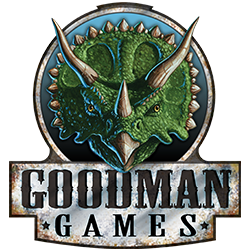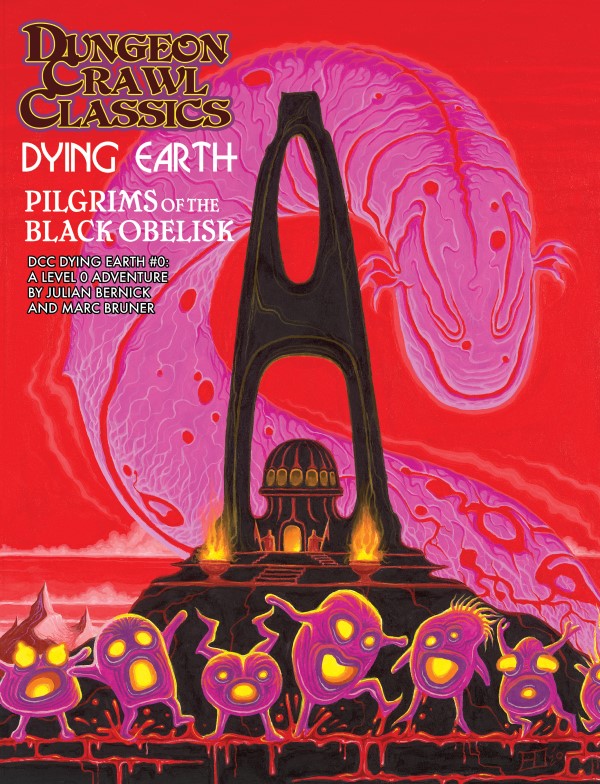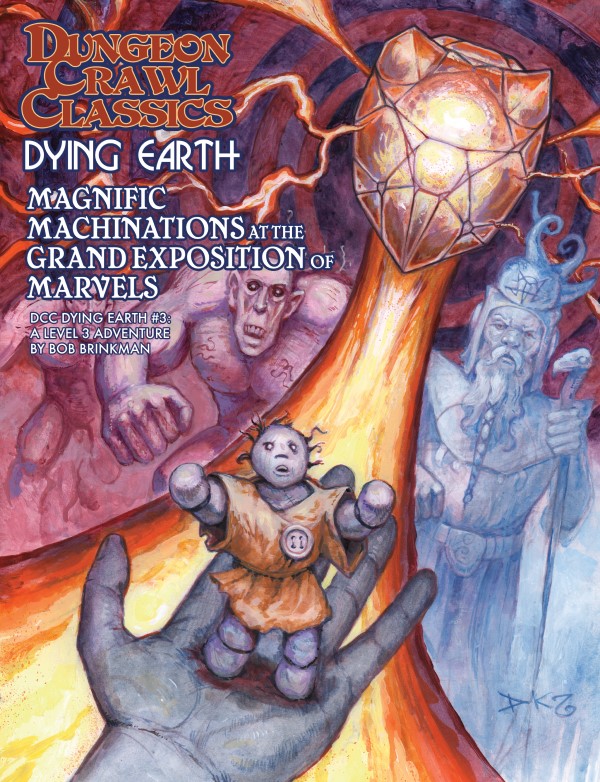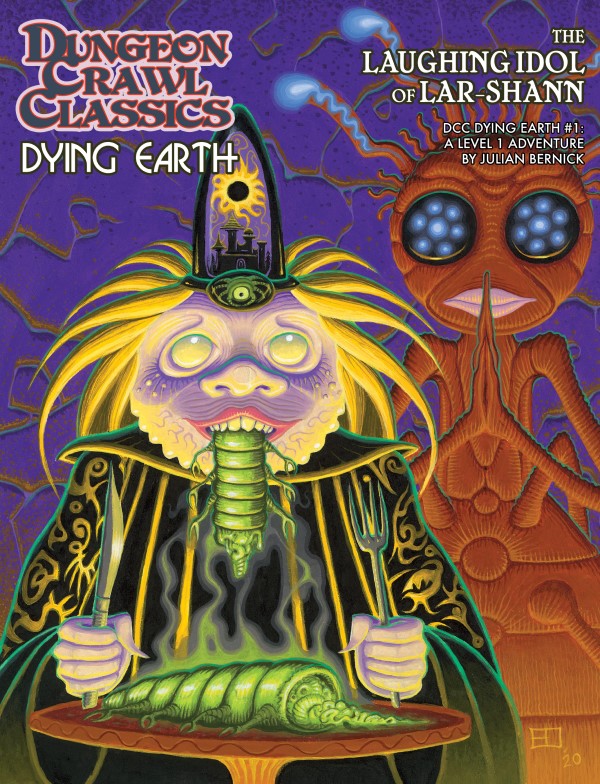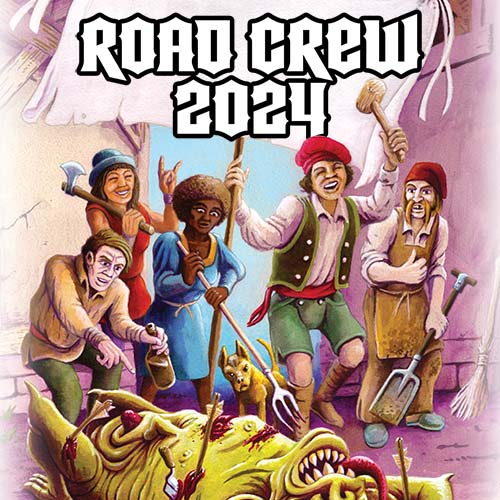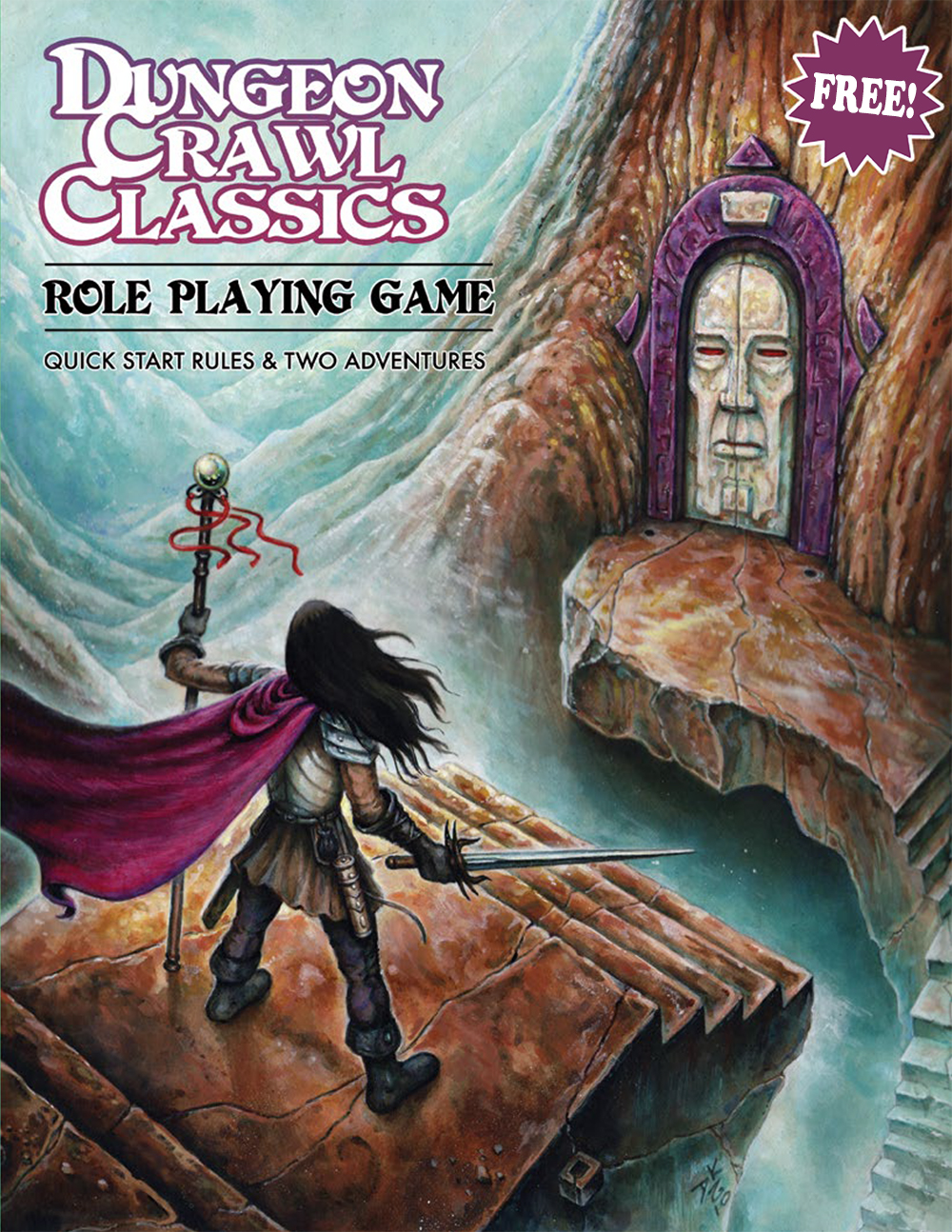
Welcome to the wondrous far-future world of DCC Dying Earth! The DCC Dying Earth Setting is an all-new gaming universe for Dungeon Crawl Classics, inspired by the classic sword-and-sorcery works of Jack Vance. To celebrate the release of DCC Dying Earth, we are showcasing a series of articles that looks at the many unique classes, spells, equipment, mechanics, and themes that go into making DCC Dying Earth a completely new experience!
The Vat-thing: A Jack-of-all-Trades, Master of Some
By Terry Olson
Beauty lies everywhere free to be seen by all — by all except you. For this I feel sorrow, for I created you. I built your primal cell; I stamped the strings of life with the pattern of your body and brain. And in spite of my craft I erred, so that when you climbed from the vat, I found that I had molded a flaw into your brain; that you saw ugliness in beauty, evil in good. – the “T’sais” chapter of Mazirian the Magician (previously titled The Dying Earth)
In creating the ruleset for DCC Dying Earth, we were eager to adapt Jack Vance’s vat-things to a PC class. One could argue that in all of Vance’s Dying Earth fiction, the characters with the most humanity are the not-quite-human vat-things. Consequently, as a class, the vat-thing has perhaps the widest scope for role-play compared to the other classes. It’s also ridiculously fun to play, because it can do a bit of everything and can contribute to almost any situation.
Reading Vance, we learn early that even the more powerful magicians are challenged by creating vat-life; they frequently get something wrong. So, a 0-level vat-thing begins play with a flaw. These flaws offer opportunities for unique social interactions as well as long term “quest for it” goals for vat-things seeking to improve their own patterns of creation. Here are a few from the Vat-Thing Starting Flaw table, on which you roll a d30 modified by Luck.
2: The PC’s flesh is covered in a skein of overlapping plates that increase its base AC to 11, but impose a -1 check penalty to all checks to climb, jump, balance, swim, move silently, and other such physical activities. Roll 1d4 for type: (1) feather; (2) scales; (3) chitinous; (4) skeel.
6: The PC is wracked by memories of a previous existence. The PC suffers a -1 to initiative rolls.
21: Incomplete genesis. The PC is a boneless creature with the pulsing surface of its brain exposed. The vat-thing suffers a loss of -1 Strength and -1 Personality.
This last flaw, incomplete genesis, spawned some hilarious interpretations in playtesting. Some hid their pulsing brain under a foppish hat only to expose reveal it for shock value. One exploited their boneless nature by attempting to thread boneless fingers through narrow holes, while another sought to tie his arms in a knot to maintain a grapple!
Another mechanic ripe for roleplay is that vat-things begin play with a creator. There is a magician that made them. The relationship with said creator is completely up to the player. However, vat-things can implore their creators for arcane intervention by casting invoke creator, so it’s a good policy, at least for the short term, to stay on the creator’s good side.
Despite their handicaps, vat-things have a wide array of skills at their disposal. Here’s a glance at the Player’s Libram vat-thing section.
Perspicacious learner: Vat creatures are natural acquirers of skill and knowledge. When making a skill check, vat-things roll 1d16 instead of the normal 1d10 for untrained skills, including thief skills.
Restoration: A vat-thing has an improved natural healing rate that strengthens over time. A vat-thing who actively adventures and gets a good night’s rest heals 1 hit point per level. Ability score loss, excepting Luck, heals at the same rate: 1 point per level per day.
Protean quintessence: A vat-thing automatically recognizes other vat-things or other wizardly creations when it encounters them. In addition, it receives a +1 bonus to any attacks made against any magical hybrids that are perversions of nature (gids, deodands, erbs, bazils, etc.).
Immunities: Vat-things are immune to non-magical disease and poison.
No true life, no true death: A vat-thing maintains a portion of its genetic material hidden away, at a location known only to the vat-thing and its creator. Any vat-thing that fails a recovering the body check may not be truly dead. It is allowed one more save, but may subtract its level from its Luck check roll. If successful, a new clone arises from the genetic material, with all of the “dead” vat-thing’s memories transferred.
Magic: Many vat-things are tutored in the basics of spellcraft and can learn and cast magic as magicians per the rules for rote magic and memorization using a rote magic spell check of 1d16 + Intelligence modifier + caster level, which—unlike a magician’s—does not improve over time as the vat-thing advances in level.
Even these alone make the class fun to play, but there is one more thing. The vat-thing has one of three specialties, each of which employs a bonus die that begins as a d3 at level 1 but increases by +1d each time the vat-thing levels up. Thus, a level 4 vat-thing has a d6 bonus die, and a level 7 vat thing employs a d10! With this in mind, consider the three specializations that follow.
Martial: You are a fighter, a tactician, a weapons-master created by an arch-mage to guard his manse and command his armies. At 0 level, a vat-thing created from a martial pattern increases its Strength and Stamina until each modifier increases by one (e.g., a 9 Strength increases to a 13, and an 18 Stamina increases to a 20). In addition, starting at 1st level, a martial vat-thing receives a bonus die which is used when making attacks.
Paragon: You are a sculptor, a painter, a dancer, a courtesan made to fill a reclusive magician’s household with works of art and the vibrant sounds of creation. At 0 level, a vat-thing created from a paragon pattern increases its Agility and Personality until each modifier increases by one (e.g., a 9 Agility increases to a 13, and an 18 Personality increases to a 20). In addition, starting at 1st level, a paragon vat-thing receives a bonus die which can be used when making skill checks.
Theologue: You are the memory, a counselor, a savant shaped by a great sorcerer to be a living encyclopaedist. At 0 level, a vat-thing created from a theologue pattern increases its Intelligence ability score until the modifier increases by one (e.g., a 9 Intelligence increases to a 13). In addition, starting at 1st level, a theologue vat-thing receives a bonus die which can be used when making spell checks, including when attempting to learn new spells or re-roll an existing one upon leveling (see Magic below).
With one of these specialties, the vat-thing can be a dominant contributor in an encounter. The high-level paragon is uniquely interesting, rolling a d16+bonus die (so d16+d10 at level 7) for an untrained skill! They can do almost anything!
My own feedback from playtesters who played vat-things has been very positive, with players really getting into the role and enjoying its peculiarities. Even with fundamental flaws and possibly demanding creator, you’ll have a blast being a jack-of-all-trades, master of some!
